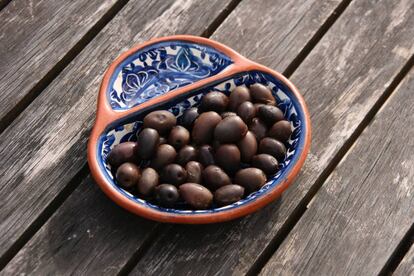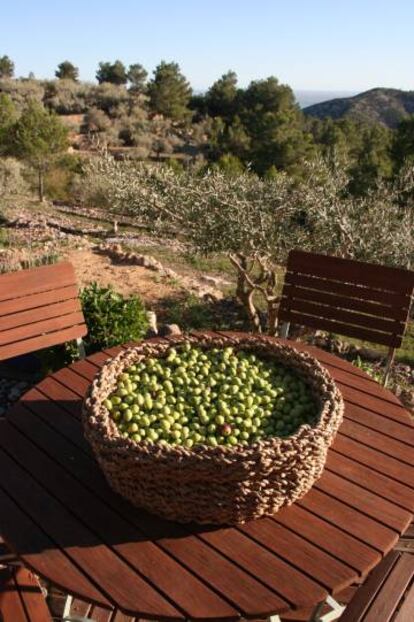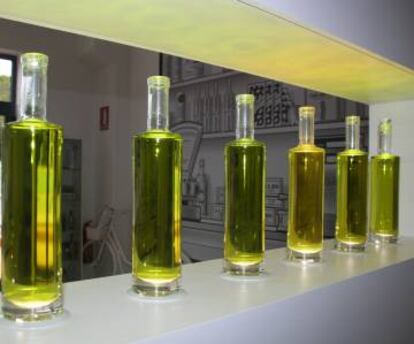Blending tradition and innovation
Spain produces half of the world’s olive oil, but it’s not all created on an industrial scale. Julie Pybus meets some ambitious small-scale farmers in southern Catalonia who are taking an entrepreneurial approach

Have you ever tried chocolate and olive oil together? At Terra de Burgans, a farm in a lush, green valley in Tarragona province in southern Catalonia, proprietor Maite Pallarès presents visitors with fingernail-sized cups made from dark chocolate filled with smooth, golden olive oil. It tastes sweet, bitter – and breathtakingly good.
Some people are doing things differently. They’ve recognized that olive oil is a premium product and there are new markets to explore
The olive has been cultivated in Spain for thousands of years. Today, its silvery green trees can be found throughout the country: in the south, delicate saplings are packed together in intensively farmed irrigated rows, while across Catalonia, sturdy ancient trees weather the wild winter winds on terraced family farms.
This year, Spain will produce half of the world’s olive oil, according to the International Olive Council. Over the past 10 years, global demand has exceeded supply, with new markets emerging in countries such as China and Russia.
I moved from London to rural Catalonia six years ago with my husband. In our city life, olives were an expensive delicacy, but in the Catalan countryside they’re everywhere – including growing on trees right outside our front door.

During our first year, we watched keenly as our olives ripened over the summer, turning from green to purple-black. We weren’t sure when the time would be right to pick, but then one sunny day in late November, a couple of days after our neighbors picked theirs, we embarked on our first harvest.
We didn’t collect enough to press any oil that year, but we experimented with how best to cure them to eat (and decided not to try the potentially hazardous caustic soda method again). The following year, my husband formed a collective with a few other local people, who every winter form a team to harvest the olives on each of their pieces of land, prune the trees and press their own oil. This means that now we always have huge plastic containers of thick, rustic olive oil sitting under our kitchen table, which provides us plenty to cook with for the whole year.
We’re like lots of other families in this area, many of whom – even if they live in the village – have some land with olive trees. We all make our own olive oil and if we need any more we can buy good quality, good value oil in five-liter bottles from the village co-operative. In fact, my Catalan friend’s parents insist that it’s the best oil you can buy.
A fresh approach
But around us, some people are doing things differently. They’ve recognized that olive oil is a premium product and that there are new markets to be explored.
Juliette Cayol of the International Olive Council says that although it’s difficult to predict how the sector will develop, “there is great potential” for Spain. She adds that cultivation techniques, technology and knowledge are constantly improving. What’s more, many consumers are keen to buy organic and premium brands.
Maite Pallarès of Terra Burgans is a farmer and an entrepreneur who’s energetically pursuing her aim to create high-end organic oil and sell it to discerning consumers and top-end restaurants.
During our first year, we watched keenly as our olives ripened over the summer, turning from green to purple-black
When a friend and I visit her farm, she takes us on an enthusiastic tramp around her land, which she began working in 2014. She and her 87-year-old father, José, grow fruit and vegetables and have 3,200 olive trees. This was at the last count – she’s also taking on neglected neighboring land to bring old trees back into production.
As we walk, she talks non-stop about her work. It was a childhood dream to do this, she explains, and she’s running everything according to her own beliefs – with respect for nature and the environment at the top of her list. “I believe that everything should function naturally,” she says. “For example, each insect serves a purpose. If you kill one thing, it influences other things – it creates an imbalance.”
She’s combining her father’s wisdom with her own learning. “I’m studying ley lines and water divining, while my father is teaching me all he knows,” she says. “I’ve studied oil-tasting, biodynamics, holistic management and ecological agriculture. We take into account the phases of the moon, we use medicinal plants as treatments for the land, and we use natural fertilizer.” Importantly, she has an eye on the bottom line. “I’ve also been to Tuscany to study olive oil production,” she says. “Italians are the kings of commerce.”

She’s doing nearly everything herself – planting, irrigating, pruning and harvesting – although her father still insists on driving his tractor. Moreover, she posts frequent photos of her produce on Instagram and Facebook with hashtags that highlight her passions: #km0, #organic, #salutiterritori, #somelquemengem (we are what we eat) and, more creatively, #lanovacasadelesburresigallinesjaestaapunt (the new chicken and donkey house is now ready).
We finish our visit in the living room of Maite’s little stone house. There’s a porrón (a traditional glass wine jug) sitting on the dining table oilcloth and fading family photos on the wall. And on the sideboard are a dozen or so meticulously arranged bottles and tins of this year’s olive oil. She takes one off the shelf and explains that the professionally designed label tells the story of the land.
Maite never seems to rest: her next ambition is to install her own olive press, pointing out that you can take enormous care of your trees and your olives, but it all goes to waste if the mill messes things up. “It’s difficult and hard work,” she admits. “But if I didn’t like it I wouldn’t do it.”
The appliance of science
At L’oli del mar, the approach is less about passion and more about science. The company’s headquarters sit in a clinically clean warehouse on the outskirts of the small Catalan town of El Perelló. Glass bottles filled with different shades of olive oils catch the light, and a case displays the awards that the company has won for its produce. From behind a desk, founder and self-described property and agricultural businessman Jordi Esparza runs us through the theory of creating the best olive oil. His company harvests olives from farms all over the surrounding Baix Ebre area – from the Mediterranean to the mountains and, like Maite, he is aiming to produce the best olive oil he can.

The harvesting and pressing process undergoes exhaustive quality control. “Our aim is quality, not quantity,” says Jordi. Each olive is picked carefully – as soon as there is a tear in the skin, they oxidize and increase in acidity, he explains. Within three hours, the olives are pressed and the resulting oil is bottled on demand, with the rest conserved in stainless-steel tanks in a controlled environment. Those glass bottles in the window are just for display; in fact, L’oli del mar’s oil is sold in opaque bottles to prevent the light degrading the oil.
Tasting notes are available for each of the company’s single variety oils. For example, oil from the arbequina olive gives an “intense fruity aroma with fresh notes of cut grass and very rich in secondary aromas (apple).”
Jordi is also keen to highlight the health benefits of olive oil – it’s good for your heart, helps prevent ageing and is a natural moisturizer – all these qualities are preserved if the olives are carefully handled. And that bitter taste that sometimes hits you at the back of your throat is good – it’s the mark of a fresh oil, full of health-giving polyphenols. “This is a positive attribute,” Jordi emphasizes.
Hopefully, Jordi and Maite are signaling the future for olive oil production in southern Catalonia. During November and December, our village is packed with people in vehicles taking trailers full of olives to one of the mills to be pressed. But it’s mostly the elderly who are doing this; their sons and daughters are busy elsewhere. What will happen when they are too old to work the land?
For now, tradition means that olive oil is a staple for our village and for many others in Spain, and maybe innovation means that the ancient craft of olive oil production will continue to go from strength to strength.
‘Pa amb tomàquet’ – How to enjoy olive oil like a Catalan
Pa amb tomàquet (bread with tomato) is a Catalan staple. Lightly toast some crusty bread, gently rub a cut clove of garlic across it, then rub half a mature tomato on it, squeezing out the juice and the flesh. To finish it off, sprinkle some salt and add a generous drizzle of the best Catalan olive oil.
Julie Pybus is a writer and editor who lives in southern Catalonia. She’s the founder of www.ebreconnect.cat, a website for English-speakers in the Terres de l’Ebre. Twitter @JuliePybus
Tu suscripción se está usando en otro dispositivo
¿Quieres añadir otro usuario a tu suscripción?
Si continúas leyendo en este dispositivo, no se podrá leer en el otro.
FlechaTu suscripción se está usando en otro dispositivo y solo puedes acceder a EL PAÍS desde un dispositivo a la vez.
Si quieres compartir tu cuenta, cambia tu suscripción a la modalidad Premium, así podrás añadir otro usuario. Cada uno accederá con su propia cuenta de email, lo que os permitirá personalizar vuestra experiencia en EL PAÍS.
¿Tienes una suscripción de empresa? Accede aquí para contratar más cuentas.
En el caso de no saber quién está usando tu cuenta, te recomendamos cambiar tu contraseña aquí.
Si decides continuar compartiendo tu cuenta, este mensaje se mostrará en tu dispositivo y en el de la otra persona que está usando tu cuenta de forma indefinida, afectando a tu experiencia de lectura. Puedes consultar aquí los términos y condiciones de la suscripción digital.








































